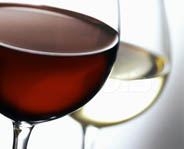
Wine And Health
Wine And Health,Benefits Are Not Without Cautions...
The medical profession has recognized the healthful and nutritive
properties of wine for thousands of years.  Hippocrates
recommended specific wines to purge fever, disinfect and dress wounds,
as diuretics, or for nutritional supplements, around 450 B.C. A
French doctor wrote the earliest known printed book about wine around
1410 A.D.
Hippocrates
recommended specific wines to purge fever, disinfect and dress wounds,
as diuretics, or for nutritional supplements, around 450 B.C. A
French doctor wrote the earliest known printed book about wine around
1410 A.D.
Most of the pathogens that threaten humans are inhibited or killed off by the acids and alcohols in wine. Because of this, wine was considered to be a safer drink than much of the available water up until the 18th century.
Wine is a mild natural tranquilizer, serving to reduce anxiety and tension. As part of a normal diet, wine provides the body with energy, with substances that aid digestion, and with small amounts of minerals and vitamins. It can also stimulate the appetite. In addition, wine serves to restore nutritional balance, relieve tension, sedate and act as a mild euphoric agent to the convalescent and especially the aged.
Although wine may be the oldest remedy and prophylactic still in use, there was an entire generation of medical professionals, especially in America, that obtained their medical education during the historical period known as Prohibition. Medical texts for nearly twenty-five years were purged and censored of any mention of alcohol, including wine, for any application other than external. This medical generation became educators to the following one, perpetuating medical ignorance of the potential health benefits of wine.
In the 1970s, the National Institute
of Health excluded and suppressed evidence from the Framingham Heart Study
that showed moderate drinkers had 50 per cent fewer deaths from coronary
disease than non-drinkers.
Only when the television news magazine "60 Minutes" reported
in November, 1991, the phenomenon that has come to be known as the French
Paradox did popular thinking of wine as medicine rather than toxin begin
to return. Typically, the diet of people in Southern France includes a
very high proportion of cheese, butter, eggs, organ meats, and other fatty
and cholesterol-laden foods. This diet would seem to promote heart disease,
but the rate there was discovered to be much lower than in America; herein
lies the paradox.
Regular moderate wine drinking was discovered to be one prominent factor. Studies in England and Denmark found the occurrence of coronary disease to be much higher in heavy or binge drinkers and (surprise!) even higher in abstainers. It is very important to note that Europeans generally drink wine and water with their meals, while Americans drink milk, iced tea, soft drinks, or coffee. (See "RX for Society: Wine and Water")
Moderate consumption of red wine on a regular basis may be a preventative against coronary disease and some forms of cancer. The chemical components thought to be responsible are catechins, also known as flavanoids. Catechins are believed to function as anti-oxidants, preventing molecules known as "free-radicals" from doing cellular damage. There are also compounds in grapes and wine (especially red wine, grape juice, dark beers and tea, but absent in white wine, light beers and spirits) called resveratrol and quercetin. Clinical and statistical evidence and laboratory studies have shown these to boost the immune system, block cancer formation, and possibly protect against heart disease and even prolong life.
A Harvard study of factors that influence aging, as reported in the May 8, 2003, issue of the journal Nature, has shown that resveratrol extends the life span of yeast cells by 80%. Preliminary results of tests on multi cellular animals are said to be encouraging; study co-author David Sinclair told Reuters News Agency that "Not many people know about it yet, but those who do have almost invariably changed their drinking habits, that is, they drink more red wine."
Another recent study, published in the 2004 year-end edition of the American Journal of Physiology, indicates that resveratrol also inhibits formation of a protein that produces a condition called cardio fibrosis, which reduces the heart's pumping efficiency when it is needed most, at times of stress.
More evidence suggests that wine dilates the small blood vessels and helps to prevent angina and clotting. The alcohol in wine additionally helps balance cholesterol towards the good type. Wine might even preserve cognitive function in the elderly. Several European studies have shown the prophylactic effects of regular light to moderate alcohol consumption may include the prevention or postponement of Alzheimer's, Parkinson's and other forms of dementia. Could wine be the original brain food?
A study published in January, 2003, in the American Journal of Gastroenterology showed that moderate, regular drinkers of wine or beer decreases the risk of peptic ulcers and may help to rid the body of the bacteria suspected of causing them. Both over consumption, especially of beer, and any regular consumption of spirits at even a low level, increased the risk.
The Harvard School of Public Health conducted a 14-year study of over 100,000 women, aged 25 to 42, from 14 states. The Nurses Health Study required participants to complete a questionnaire every two years, detailing lifestyle choices and diagnoses of any medical conditions.
The subjects were categorized into three levels of alcohol consumption. After factoring in such variables as family histories of diabetes and smoking habits, the study found that women who drank regularly and moderately (one or two drinks per day, a total of 15 to 30 grams of alcohol) had a 58% lower likelihood of developing diabetes. Both those levels that drank more or that drank less had a 20% lower risk than either abstainers or former drinkers. When preferences for types of alcohol were compared, those who chose beer and wine shared similar levels of risk, but those in who drank spirits and consumed more than 30 grams per day had a 150% higher risk to develop diabetes than even non-drinkers.
Other medical studies point to multiple benefits of regular moderate wine drinking that may include lowered risks of stroke, colorectal tumors, skin and other types of cancers, senile dementia, and even the common cold, as well as reduce the effects of scarring from radiation treatments.
Over 400 studies worldwide, many of them long-term and in large populations, have concluded that most healthy people who drink wine regularly and moderately live longer. The single group exception, whose members should not consume any alcohol, is pre-menopausal women with a family history of breast cancer. The keys to the beneficial aspects are regularity and moderation. Overindulgence can be considerably more harmful than total abstinence.
The 3rd International Wine & Heart Health Summit, held March 2-5, 2005, in Napa Valley, shared the latest information and findings.
For more information visit this url:
- Study Sheds Light On Wine’s Benefits
- Updates On Wine And Health
- Nutritional Contents Of Wine Health
- The Health Benefits Of Wine
- Updates On Wine, Alcohol And Health
- Red Wine Study








